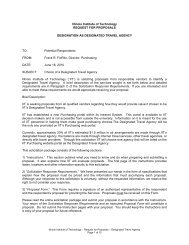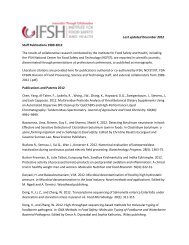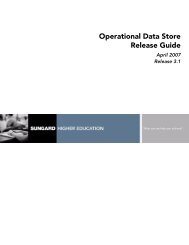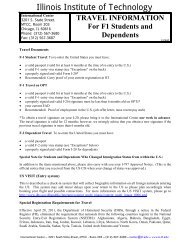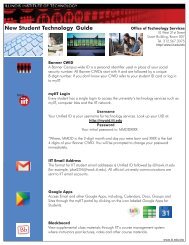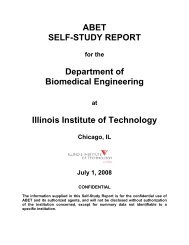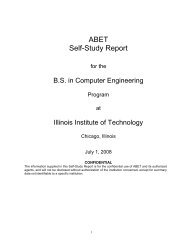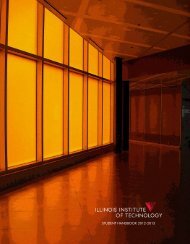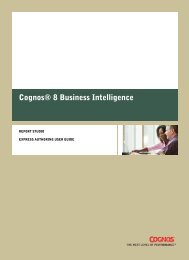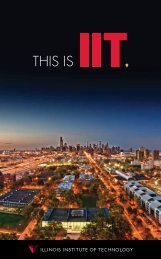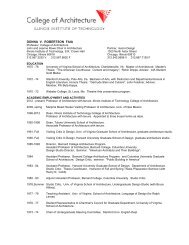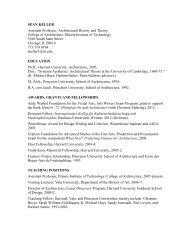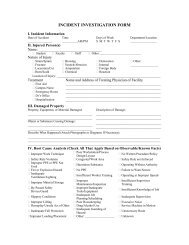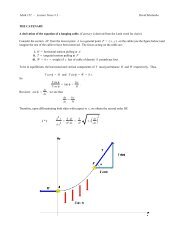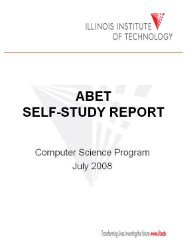Undergraduate Bulletin - Illinois Institute of Technology
Undergraduate Bulletin - Illinois Institute of Technology
Undergraduate Bulletin - Illinois Institute of Technology
You also want an ePaper? Increase the reach of your titles
YUMPU automatically turns print PDFs into web optimized ePapers that Google loves.
Mathematics and Science Education<br />
Mathematics and Science Education<br />
Department Website: www.iit.edu/csl/msed<br />
South Tower 4007<br />
3424 S. State St.<br />
Chicago, IL 60616<br />
312.567.3661<br />
The Department <strong>of</strong> Mathematics and Science Education<br />
has an education program that prepares students for a<br />
teaching certificate at the secondary level (grades 6-12)<br />
while they receive a Bachelor <strong>of</strong> Science degree in Biology,<br />
Chemistry, Physics, Applied Mathematics, Computer Sciences,<br />
an engineering discipline, or a related field.<br />
A math or science teacher must know the subject matter<br />
as well as how to teach it. The Department <strong>of</strong> Mathematics<br />
and Science Education is a discipline-based teaching<br />
program. Students will learn how to effectively teach their<br />
chosen disciplines because the curriculum focuses on each<br />
student’s chosen discipline as opposed to general education.<br />
The program draws primarily from constructivist epistemology<br />
as a means by which knowledge is developed<br />
and fully recognizes the individual perspectives from which<br />
learners approach school and life situations. Additionally,<br />
the knowledge base utilizes contemporary research<br />
on teaching and learning and is philosophically and substantively<br />
aligned with <strong>Illinois</strong> Content Standards and the<br />
pr<strong>of</strong>essional subject-matter organizations. Graduates <strong>of</strong><br />
the program will be leaders in instructional innovation in<br />
mathematics and science.<br />
The overall organizational framework for the program borrows<br />
heavily from Shulman’s (1986) Knowledge Growth in<br />
Teaching with the ultimate focus on the Teacher as Transformer<br />
<strong>of</strong> Subject Matter. At an operational level, the program<br />
focuses on the development, revision, and elaboration<br />
<strong>of</strong> six primary domains <strong>of</strong> knowledge that both theory and<br />
research have indicated are essential for effective instruction.<br />
It is this combination <strong>of</strong> domains <strong>of</strong> knowledge that<br />
distinguishes the expert teacher from others possessing one<br />
or more <strong>of</strong> the following domains <strong>of</strong> knowledge: subject<br />
matter knowledge, pedagogical knowledge, knowledge <strong>of</strong><br />
schools, knowledge <strong>of</strong> learners, curricular knowledge, and<br />
pedagogical content knowledge.<br />
Within the Knowledge Growth in Teaching model, the IIT<br />
program is committed to providing students with experiences<br />
that help them develop a full range <strong>of</strong> knowledge and<br />
skills in the areas <strong>of</strong> subject matter, pedagogy, pedagogical<br />
content knowledge, schools, learners, and curriculum within<br />
a framework <strong>of</strong> moral and ethical societal norms, including<br />
a commitment to equity and diversity. From a constructivist<br />
perspective, individuals are continually structuring<br />
knowledge and revising their knowledge in response to<br />
differing contexts and new knowledge/perceptions. Consequently,<br />
it is important to note that the program does<br />
not view any <strong>of</strong> the domains <strong>of</strong> knowledge as completed<br />
outcomes upon graduation. Rather, the domains provide a<br />
basis for continued life-long pr<strong>of</strong>essional development.<br />
Specific Program Outcomes<br />
Program graduates will demonstrate their knowledge <strong>of</strong> the<br />
stated domains <strong>of</strong> knowledge by:<br />
• The development <strong>of</strong> integrated and in-depth subject<br />
matter knowledge in topical areas directly relevant to<br />
teaching content specialty (Subject Matter Knowledge).<br />
• The successful development <strong>of</strong> instructional materials/plans<br />
consistent with research on teaching/learning<br />
and supports emotional development (Pedagogical<br />
Knowledge).<br />
• Successfully working within the school and community<br />
in a manner that fosters community and state instructional<br />
goals (Knowledge <strong>of</strong> Schools).<br />
• The development and implementation <strong>of</strong> instructional<br />
materials and plans that are consistent with current<br />
cognitive and social theories on student learning and<br />
personal development for all students regardless <strong>of</strong> their<br />
race, ethnicity, gender, sexual orientation, language, religion,<br />
socioeconomic status, and regional/geographic<br />
origins (Knowledge <strong>of</strong> Learners).<br />
• Appropriate selection <strong>of</strong> instructional/curriculum materials<br />
relative to local, state, and national curriculum<br />
goals and reforms, and exhibited ability to analyze and<br />
revise materials so that they are consistent with appropriate<br />
curriculum goals (Curricular Knowledge).<br />
• Successful development and implementation <strong>of</strong> instruction<br />
that represents current subject matter to students<br />
in a form that promotes in-depth understanding and<br />
ability to apply knowledge to new and unique situations<br />
(Pedagogical Content Knowledge).<br />
121



